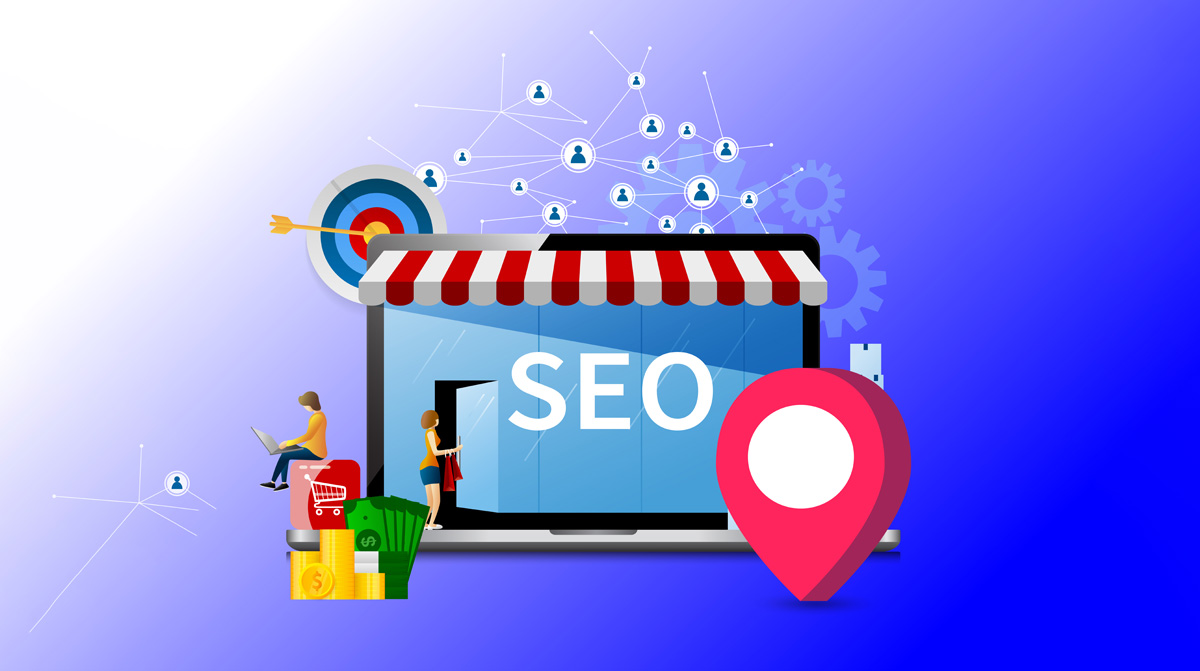The security of their user’s data has to be the most crucial aspect of running the business for an eCommerce business owner.
Besides, why not? Attack patterns over the past suggest that over 30% of the organizations facing a cyberattack lose over $1 million in a calendar year. In 2020 alone, the eCommerce fraud market was estimated to be over $28 billion, aiming to grow to $1 million by 2025.
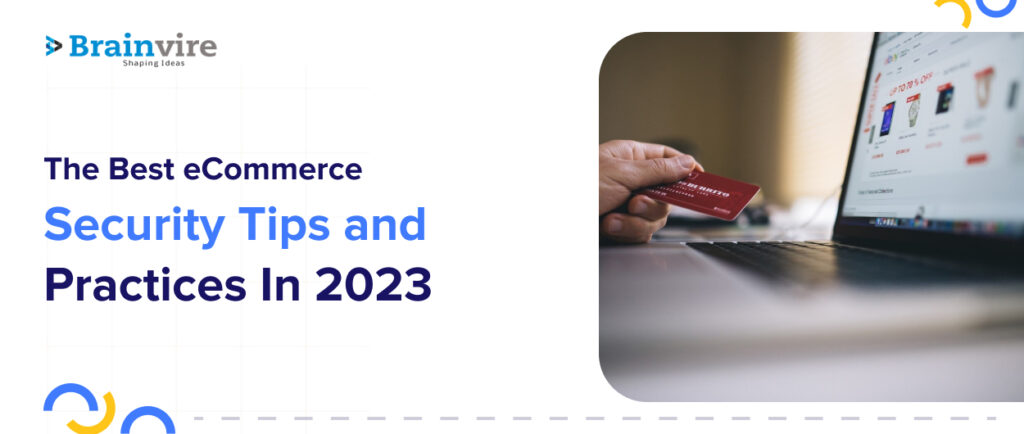
Every year, online businesses lose a hefty sum of money to cyberattacks. These hacks and attempts are primarily possible due to the ineffective implementation of security features over different eCommerce websites development. A weak eCommerce security administration makes it easier for hackers to steal data packets from the host website.
So, what should your eCommerce business do to ensure complete data security of its users and operations?
Let’s find out as we delve deeper into this topic in this blog. The following sections give you an insight into the importance of security, major security threats to eCommerce, and some tips and practices to avoid any data breach effectively. Let’s get started!
eCommerce Security Should Be Among The First To-Do’s
If we look at it broadly, eCommerce security will comprise several globally accepted guidelines that promote a safe purchase experience. The level of security on a website determines the overall purchase experience of its users, in turn determining the brand’s goodwill.

The current trends in eCommerce web development require website owners to be protective of their customers’ data. Moreover, given the rate of attacks that eCommerce websites face, it’s almost challenging for business owners to ensure complete safety for their users.
However, when the store owners can put the right mix of security measures and protocols into their operations, they’re at a chance to prevent other third parties from accessing the data processing between customers and the website.
Interestingly, that’s not all! Here’s an overview of the perks of integrating reliable security measures during your eCommerce web development:
Authentication To Validate Access Based On User Roles
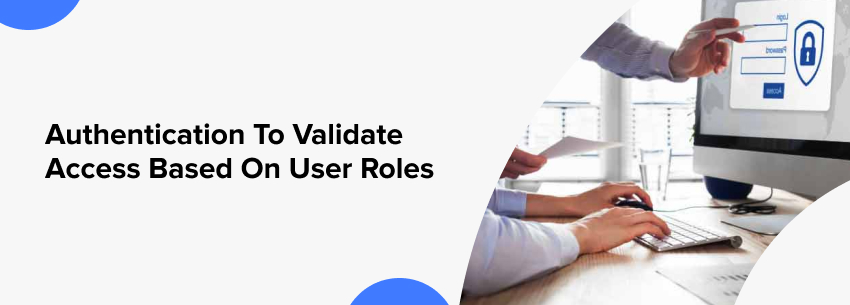
The internet is filled with low security websites that are open to be surfed by the public. Exploring such websites doesn’t require you to authenticate information with such websites, keeping you away from web attacks. However, things are different over eCommerce websites as they can’t run without requiring crucial customer data. Here you should apply some effective customer data management techniques to over come the challenges.
You must protect this data with proper authorization and authentication as a store owner. For instance, 2FA is used by eCommerce websites to prevent intervention by any third party. This way, your customers can rest assured about safety while they shop.
Secure Storage Of Sensitive Information With Strong Data Encryption
Data is the core of operations for eCommerce businesses. Such websites use the data secured by visitors to send them reminders to complete the purchase, suggest new product categories, and remind them of upcoming sales, among different factors.

Since data plays such a crucial role in running multiple aspects of an eCommerce business, it’s also one of the major security threats to eCommerce. Therefore, store owners need to ensure their website has high-end data encryption. This is where businesses should implement data encryption that protects user data across multiple devices.
Protection From Malware Like SQL & HTML Injection
HQL and HTML injections are among the most popular techniques for connecting online retailers and eCommerce store owners. A breach in the data flow between these injections is an obvious security breach on the website. Such attempts could result in extracting sensitive information like customer records, listing user authentication information, damaging databases, credit card numbers, and adding or removing data on the website.
However, users with the right software to protect their websites from malware like SQL and HTML injections are much safer conducting business. Such configuration ensures the website avoids such attempts while protecting the servers’ critical data.
Accommodate Future Business Needs Without Security Concerns

Every business owner starts their operations with the hope of expanding it. However, many owners need more technical support in their growth years for eCommerce stores. Website owners frequently understate the significance of selecting a safe solution for their website.
A safe and reliable eCommerce platform (or host) can save your business from data breaches. Moreover, suppose your store has the latest security measures and a strong cloud firewall. In that case, it serves as an additional security net and adds to the store’s goodwill.
So now that we have an idea of how a sound security system adds to an eCommerce website let’s check out some common security threats faced by a majority of store owners.
Understanding eCommerce Security Threats
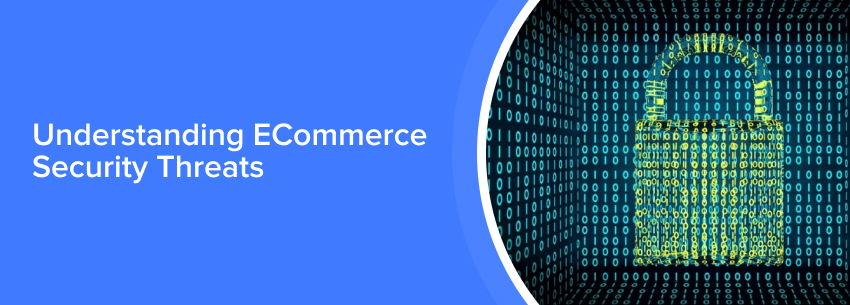
The growth of eCommerce over the last years has also increased the risk to data security. When running your eCommerce venture, you must know the common security threats impacting the users. Let’s check some of these threats in the following section:
Data Security
Data security is one of the most crucial aspects of eCommerce security and safety. It covers different aspects of customer protection. It can be categorized as data protection from hack attempts, malware, and denial of service (DoS) attacks.
- Hacking – Hacking refers to a cyberattack involving gaining unauthorized access to a network or computer system. Hackers use this method to modify existing files or steal customer data from your eCommerce website.
- Malware – Malware refers to software intended to disable or corrupt computer systems. Malware commonly comprises spyware, ransomware, and viruses.
- Denial of Service (DoS) Attacks – As the name suggests, DoS attacks are such attacks that make a computer network or system unavailable for use. This hacking method generally involves an overflow of traffic or requests on your website, causing significant disruptions to an eCommerce store, including a website crash or no access to a website.
Payment Security

When discussing possible security threats to eCommerce, you can’t miss out on the most obvious payment security threat. Under this threat, hackers and scammers try to extract users’ payment methods information (including credit card numbers) to cause financial losses to the website.
Payment security threats generally include credit card fraud, phishing, and skimming.
- Credit Card Fraud – Credit card fraud happens to be one of the most prevalent types of payment security danger. Credit card hackers often leverage stolen card details to make illicit transactions. The entire transaction happens without the awareness of the cardholders, leading to financial loss and impact on the goodwill of the eCommerce store.
- Phishing – Hackers frequently employ phishing to get access to private data. In this method, they send emails that falsely appear to be from a trustworthy source. Once clicked or downloaded, these emails frequently include a harmful link or file that infects the user’s PC with malware.
- Skimming – Skimming is another risk around the payment security of eCommerce websites. It occurs when an uninvited party attaches a device to an ATM or payment terminal to access credit card data.
Network Security

Next, we have ‘Network security,’ another essential part of the eCommerce security strategy. Sound network security is important because hackers and scammers can leverage weak network security to access your website and make unauthorized changes.
Here are some changes that occur around weak network security:
- Unauthorized Access – Unauthorized access to a website can be a nightmare for eCommerce owners. It poses a serious security risk to eCommerce systems and is also dangerous for the store’s future. Hackers generally attempt to get unauthorized access using phishing scams and malicious malware attacks, among other illegal actions.
- Insecure Network Infrastructure – A weak network infrastructure is another security threat to an eCommerce store. Once hackers detect an insecure network infrastructure, it becomes easier for them to crack the firewalls and access customers’ personal data.
- Poor Password Management – Poor password management is another risk that eases the work of hackers. Passwords that are easier to crack lead hackers into your website in a more short time, allowing them to access data before your systems can detect any suspicious attack on the site.
Looking at most threats to your website, you might think, “what are the security measures in eCommerce?.” Interestingly, there are not one but several eCommerce security practices that will help you secure your store and prevent theft. Let’s learn more about them in the following section.
Best eCommerce Security Practices
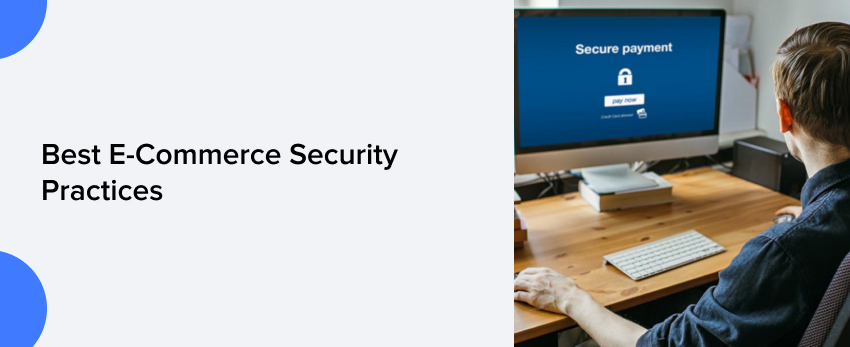
Data Encryption
Encryption is among the best eCommerce security practices every store owner must follow. It helps store owners secure digital data using several mathematical techniques known as cryptography. Encryption helps scramble the data into complex, unreadable codes and numbers as the algorithm changes the plaintext (original text) into ciphertext (an alternate form of the text).
Once done, only a binary key or password can decrypt data when authorized users need to read it. After they input the password, the algorithm will convert the ciphertext into plaintext again, allowing the user to access the original data in no time.
Secure Sockets Layer (SSL)
SSL encryption significantly transfers financial information between a customer’s device and the payment processor. It acts as a safety net to transfer details safely without it being accessed by third-party servers.
For instance, you might have noticed websites that read ‘not secure.’ This indicates that the websites don’t have an SSL in place. Once the security level is in place, HTTP becomes HTTPS, indicating the industry standard for internet security.
Lack of SSL is a poor security practice that may deter people from accessing your website. Besides, if you don’t have SSL protection, search engines will also pop-up warning pages, indicating the page isn’t safe.
So if you’re an eCommerce store owner, always use SSL and HTTPS. Wonder why? We suggest this because HTTPS improves your site’s SEO and helps secure higher page ranks.
Regular Software Updates
Regular software updates are necessary if you aim to safeguard your eCommerce website against online dangers. Staying updated with your software upgrades and program patches is crucial as they may include security changes that can assist safeguard your website. Besides, it’s also crucial to keep an eye out for any unusual behavior related to your website’s IP address and domain name.
eCommerce Security Technologies
Firewall Protection
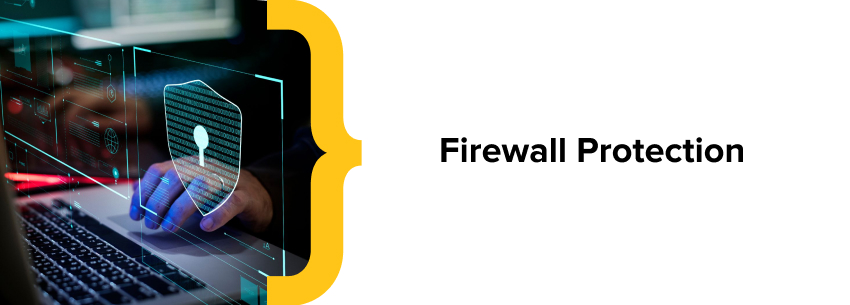
eCommerce security is becoming a significant concern, but thankfully Firewall Protection is doing an excellent job of making this a secure environment. These tools are generally used to prevent unauthorized access to private networks accessing the internet. More importantly, Firewall Protection works extensively well in terms of protecting networks using the intranet mechanism.
With Firewall Protection, every message leaving or entering the intranet has to pass through an examination. This means the protective wall will examine every message and block that fails to meet the specified security standards. The best part about Firewall Protection is you can get them in either software or hardware configurations.
However, most experts recommend configuring Firewall Protection in software and hardware to get better protection. This will ensure that Firewall Protection limits access to your device and network simultaneously. Firewall Protection allows users to access private networks remotely with secure authentication logins and certifications. This establishes stringent security with the ability to access your files and data remotely.
Intrusion Detection and Prevention Systems (IDPS)
The Intrusion Detection and Prevention Systems (IDPS) technology will record all violations or illegal activities. As a result, the technology does an excellent job of protecting the computer network from unauthorized access. Furthermore, the technology uses a predictive model to distinguish between good and bad connections to avoid further complications.
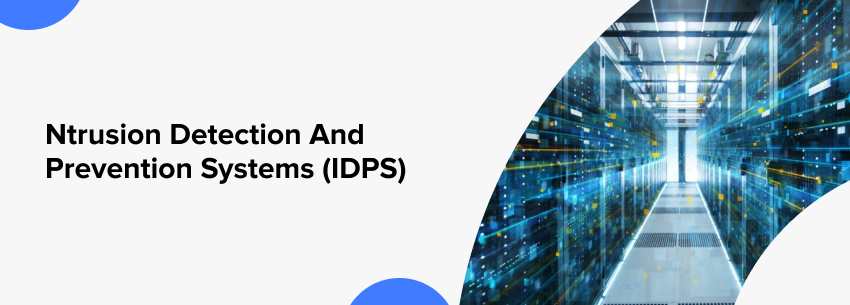
Even better, the Intrusion Detection and Prevention Systems (IDPS) technology will record all violations or illegal activities. As a result, the technology does an excellent job of protecting the computer network from unauthorized access. Furthermore, the technology uses a predictive model to distinguish between good and bad connections to avoid further complications.
eCommerce websites can leverage the potential of Intrusion Detection and Prevention Systems (IDPS) technology to detect any malicious activities and address them before causing any damage. Besides that, this technology can also help ensure unmatched compliance while enhancing network performance. But more importantly, Intrusion Detection and Prevention Systems (IDPS) will provide valuable insights into network traffic, helping one detect weaknesses and address them effectively.
Security Information and Event Management (SIEM)

Security Information and Event Management (SIEM) is the combination of two technological concepts working together. These concepts include Security Information Management (SIM) and Security Event Management (SEM). These technologies form a unique software-based concept working together and providing administrators with a holistic view of the IT security system.
One of the best parts of using Security Information and Event Management (SIEM) is that it always adheres to company-specific requirements. As a result, it becomes much easier for IT administrators to access clearer and more individualistic definitions of processes related to network security. This further makes it easier to prioritize security threats accordingly and offer a reasonable response to the same.
eCommerce businesses attract varied and extensive traffic from around the globe, making Security Information and Event Management (SIEM) their ideal security technology. Businesses can leverage this technology to set comprehensive security standards and guidelines to maintain network security. This will further help them establish better credibility among customers and drive better conversion rates.
Human Factors in eCommerce Security
eCommerce security is far more nuanced and complex than many might imagine since multiple stakeholders are at play. Apart from securing your computing systems, one must also pay close attention to human intervention’s role in this scenario. This human intervention includes employees and customers of the eCommerce platform, both active network participants.
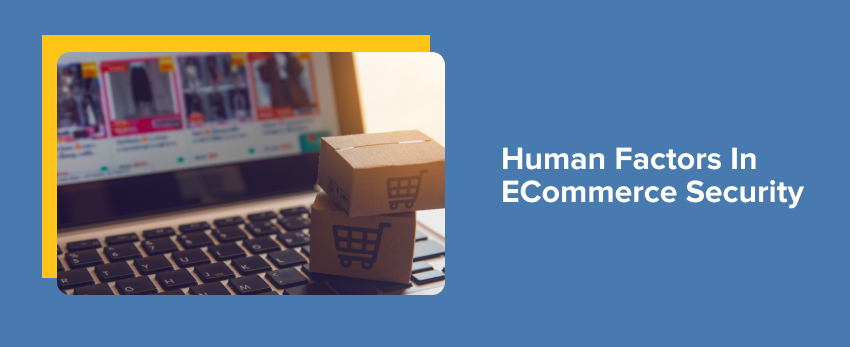
This, in turn, makes it very important that eCommerce businesses take all the necessary measures to train their employees. Fortunately, there are many ways to realize this, including cybersecurity awareness programs for Online Business, security compliance training, and more. But getting the best results with these efforts will also need you to adhere to the best practices for training employees about eCommerce security. Therefore, investing in employee training for eCommerce security can be a game changer for the overall security of your eCommerce business.
Educating and training your employees is just one side of the coin regarding addressing human factors in eCommerce security. This means eCommerce businesses must also make all necessary efforts to educate customers about security concerns. eCommerce businesses can consider leveraging awareness campaigns to inform customers about the best security practices when using any eCommerce platform. This will yield long-term benefits for the eCommerce business, including better customer experience and amplified credibility among eCommerce customers.
Emerging Trends in eCommerce Security
The eCommerce security sphere is evolving fast, as with every other realm of technological advancement. Many new technologies are entering the market and changing things greatly while creating recent trends. Biometric authentication and artificial intelligence in cybersecurity are among the most dominant eCommerce security trends.
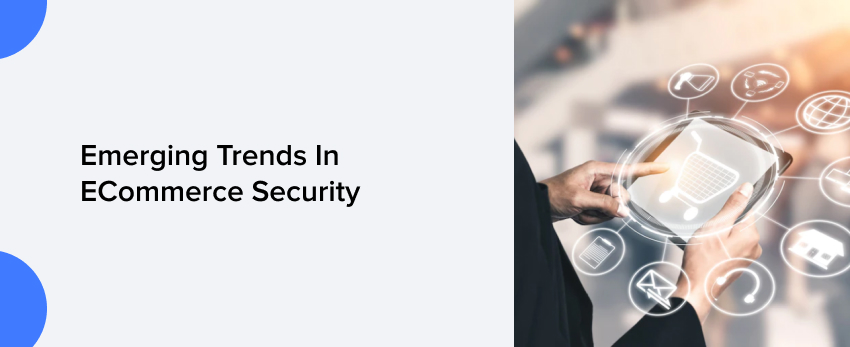
Using eCommerce websites is great until you realize you must remember multiple passwords to login into different problems. But wouldn’t things be much easier if one password could help customers access whatever they want? This is where biometric authentication is transforming eCommerce security with well-thought-out applications. eCommerce businesses now use biometric authentication to help customers access business offerings with unmatched security. Besides that, biometric authentication also makes detecting any unauthorized access attempt easier.
Another noteworthy game changer in eCommerce security comes with the Artificial Intelligence application development. Most eCommerce businesses leverage AI models’ potential to determine security threats and deploy appropriate actions.
Besides that, AI application is also taking center stage in enhancing the overall vulnerability management of eCommerce websites. eCommerce businesses are also using AI to enhance existing biometric authentication mechanisms to prevent malicious attacks on the eCommerce network. Detecting spam emails is also becoming easier for eCommerce businesses with practical AI applications for better security.
Conclusion
The existing global eCommerce marketing is growing extensively, simultaneously increasing the number of stakeholders. As a result, enhancing existing eCommerce security is now becoming more critical than ever. Besides, hackers and attackers no longer rely on conventional tactics to breach eCommerce security. This makes it even more important for eCommerce businesses to keep up with this evolution and ensure better eCommerce security.
Currently, hacking, misusing customer data, phishing attacks, credit card fraud, and phishing attacks are some of the leading eCommerce security threats. But fortunately, even eCommerce businesses now have many alternatives to strengthen their security. They can leverage the potential of advanced technologies such as machine learning, AI, biometric authentication, and much more for better security. This will help them establish better market credibility and even help sustain their business in the long with undeterred compliance.
It is now more critical than ever that eCommerce businesses understand this entire ordeal of eCommerce security threats. This will help them better understand attackers’ tools and tactics to create a security breach. Besides that, eCommerce businesses must also familiarize themselves with the latest eCommerce security technologies and use them to their advantage. Using trending eCommerce security technologies and understanding the human role in eCommerce security can also go a long way in enhancing security.
[Continue reading: Artificial Intelligence Project Ideas For Business Transformation]
FAQs
eCommerce security is a set of best practices and guidelines that help stakeholders have a safe and secure eCommerce shopping and selling experience. Every eCommerce business must take appropriate measures to protect itself and its stakeholders from cyberattacks.
Educating employees and stakeholders, implementing layered security, using the latest eCommerce security practices, backing up data, choosing the right hosting provider, installing SSL, and following PCI-DSS requirements are some of the best practices for eCommerce security.
Many different trends are emerging in the sphere of eCommerce security. However, the application of biometric authentication and artificial intelligence (AI) in eCommerce are two of the most notable eCommerce security trends in 2023.
eCommerce threats are evolving, and 2023 has also made way for some new threats that eCommerce businesses need to be wary of. These notable eCommerce security threats in 2023 include supply chain attacks, ransomware, cloud-based attacks, phishing attacks, and API attacks.
Deepfakes are audio or video representations created by malicious actors by stealing an individual’s identity. This technology identifies all information about a targeted individual and leverages AI tools to create digital depictions replicating those individuals. eCommerce businesses must be wary of these developments since people can use them to steal data or pave the way for other eCommerce security complications.
Training eCommerce employees to identify deep fakes, tightening compliance procedures related to authorization norms, investing in deep fake detection solutions, and taking insurance covers are some of the best ways to save eCommerce businesses from deep fake attacks.
Ensuring thorough assessment of open-source dependencies, implementing zero trust policies, ensuring continual scan of repositories, educating and training stakeholders, and leveraging secure hyper ledger technologies are some of the best ways to save eCommerce businesses from supply chain attacks.
Payment processing system threats are one of the most concerning eCommerce security threats in today’s day and age. Therefore, eCommerce businesses must leverage the potential of Secure Sockets Layer, commonly known as SSL, to make payments more secure on their websites. This unique mechanism will encrypt all customer information when it moves between the server and the website. More importantly, SSL certificates play a crucial role in helping eCommerce businesses establish better credibility among customers.
Dealing with an eCommerce security breach is not easy, but businesses must start acting quickly when they detect the breach. Following this, they must take measures to contain the breach and evaluate the damage. This will be followed by determining and fixing vulnerabilities while informing stakeholders simultaneously. Lastly, eCommerce businesses must test their security defenses and implement new policies and procedures to prevent any such attacks in the foreseeable future.
Related Articles
-
SEO Best Practices For Your Magento Store
Magento is definitely SEO (Search Engine Optimization) friendly out of the box, but there are still a lot of things to consider from an SEO perspective if you are considering
-
From Cart Abandonment To Slow Load Times: Streamlining The E-commerce Experience
The success of any eCommerce solution company depends on streamlining the ecommerce experience through a well-designed and user-friendly website in today’s competitive market. Various factors, including Cart Abandonment Solutions, Mobile
-
What’s New in Magento 2.4?
After it was announced in 2019 that Adobe has acquired Magento, murmurs of the platform upgrade circled back and forth in the community. It took nearly a year after the


